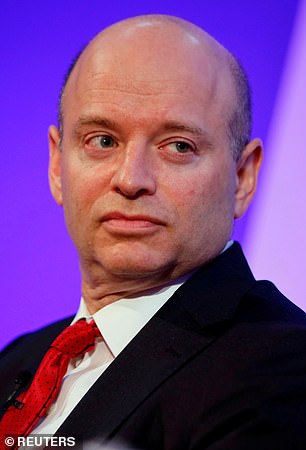The number of Footsie companies lobbying for pay rises for their chief executives has increased even after the average salary hit £4.5m, a study has revealed.
As the debate over boardroom excesses intensifies, Deloitte analysis showed that 16 FTSE 100 companies are looking to revamp their pay policies this year.
This includes nine who plan to significantly increase the maximum they offer their boss.
This time last year, only four blue-chip companies were seeking big pay increases, according to the accounting and auditing giant’s report.
The research is based on the first 55 Footsie companies that published their annual reports this year.
Big cat pay: As the debate over boardroom overreach intensifies, analysis by Deloitte showed 16 FTSE 100 companies are looking to revamp their pay policies this year.
The calls for more generous potential rewards come despite the average salary of a FTSE 100 boss rising 4 per cent to £4.5m last year.
Board salaries have once again become a major issue in the city as companies look to compete with American rivals, where salaries and bonuses are typically higher.
AstraZeneca was rocked last week by an investor revolt when 35 per cent of shareholders voted against a deal that could see chief executive Pascal Soriot pay out up to £18.7m this year.
The backlash came after influential shareholder advisory groups Glass Lewis and ISS told investors to vote against the “excessive” remuneration plan at the pharmaceutical giant’s annual meeting.
However, the package was eventually approved by shareholders thanks to Soriot’s vocal supporters, including major shareholder GQG Partners, which said it was “grossly underpaid”.
Over the weekend, AstraZeneca chairman Michel Demare criticized senior advisers for “double standards” that “cause serious damage” to the competitiveness of British companies.
But it’s not just the UK pharmaceutical industry that is feeling the pressure on wages. Smith & Nephew is facing its own showdown after shareholders were urged last week to reject a pay rise for its US-based boss.
Under proposals from the London-listed medical equipment group, chief executive Deepak Nath could receive £9.4 million next year if he meets targets.


Beneficiaries: AstraZeneca boss Pascal Soriot, left, and London Stock Exchange chief executive David Schwimmer, right, are among those hoping for big pay rises.
But ISS called it “excessive” and recommended that investors reject it at next month’s annual meeting.
The London Stock Exchange Group is also trying to convince shareholders later this month about the pay of its chief executive, David Schwimmer.
Under his plans, he will have the chance to earn double his current maximum package of £6.25 million.
Mitul Shah, a partner at Deloitte, who advises companies on their pay policies, said the trend of “more radical pay proposals” was due to growing competition for talent.
He said: “Many of these companies have a significant presence in the US and cite the disparity in pay levels between the UK and the US as a challenge to competing and retaining senior talent in a market global”.
Mark Austin, a lawyer at global law firm Latham & Watkins, said: “If large international companies listed in London want to compete for talent globally, they must be able to offer competitive compensation.”
Prominent City business figures, including Julia Hoggett, chief executive of the LSE Group’s securities business, are pushing for higher pay for executives. But some have raised concerns about the growing push for executive pay.
Luke Hildyard, of the High Pay Centre, said: ‘This is obviously good news for CEOs and other high-earning professionals. It remains to be seen what benefits it will bring to the rest of the country.’


